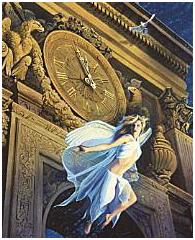Chronos
| Chronos | |

| |
| Tenets | Time, Fate, and the Inevitable |
| Status | Inactive |
| Religious Symbols | |
| Animal | snail |
| Plant | willow tree |
| Food | fortune cookie |
| Refectory | |
| Food | Unknown |
| Drink | Unknown |
| Acceptable Axes | |
Throughout the infinity of reality, there has been one constant: the passage of Time. Men, beasts, kingdoms, and even gods are born, shine brightly for a moment, then fade away into oblivion. Throughout it all, time plods on- unbiased, uncaring, unmoved, unconcerned, unfeeling. It simply moves onward.
Chronos proclaims that all that will happen has already been written. Beings, both mortal and immortal, merely tread upon the path that fate has laid out in front of them. There simply can be no other possibility, because the only explanation for the infinite consistency of the passage of time is the existence of a grand orchestrator of all beings' actions. If even a single creature, organism, or atom had ever had free will, certainly a break in the pattern of time would at some point have been created.
Thus, individual acts are of no consequence or personal meaning. They are merely that which a being was programmed to execute. Of course, this does not make these acts right, or wrong, just, or beyond reproach. For just as an act can be preordained, so too can the punishment for that act.
Chronos devotes her entire existence to the monitoring of the passage of time. She seeks to discover a discernible pattern and she is always hoping that somehow, somewhere, sometime, there will be a fluctuation that will break the universe out of this chain of controlled events. She is constantly in pursuit of a way to unlock the secrets of time and fate. Since everything is preordained, unlocking this secret would be the key to infinite knowledge. Chronos believes that she is preordained to discover this secret, but it is such a tightly wrapped mystery, it would require almost infinite power to unravel. For this reason, Chronos must expand the size of her religion and priesthood — for as the universe stands now, a deity can only gain more power by increasing the number of its worshipers.
Chronos proclaims that there is only one way to end this eternal inevitability, and that is to unlock the pattern of time and fate. Once the pattern is discovered, all that is required is for a single cell to move or act in complete discordance with fate. Doing so will destroy fate forever, and send the universe into an infinite condition of chaos. The result of this would be free will for every bit of matter in existence. After enduring an eternity of slavishly following the commands of fate and time, such a condition would be the perfection of the universe.
Chronos laughs at the silliness of Gethsemane and his followers. Gethsemane's "Chaos" is nothing but a preordained illusion of chaos. Chronos gets a chuckle out of Gethsemane, and figures that fate has played the ultimate trick of deceit upon him by providing Gethsemane this illusion of false chaos. Both Gethsemane and Chronos agree however that chaos is a very good thing. The difference is that Chronos believes it does not and simply cannot exist considering the present state of the universe. True chaos, and thus freedom from the yoke of inevitability, is an ideal to be strived for.
Most of the other gods of the pantheon are often angered by Chronos, because if mortals fell in line with her thinking, they would find absolutely no need for the other deities. After all, why pray and sacrifice to deities for assistance if everything that will be has already been decided? Further, Chronos' arrogance that she will be the savior of the universe is simply too much braggadocio for the other deities to bear. When she drones on about this prophecy, many deities are driven nearly to attacking her.
Clerics of Chronos fanatically seek to enhance the worship of Chronos, for they believe that the sooner Chronos achieves suzerainty over the gods, the sooner free will can be granted to the universe. They are some of the most vocal preachers of any religion, as they enjoy the highly intellectual and philosophical aspects of Chronos' theology. They spend most of their lives trying to convince others of the truth of this philosophy and hope in the process to convert them to the faith. Similarly, Chronos' disciples tend to be intrigued by any intellectual debate and revel in a chance to delve into the deepest meanings of even the most simple occurrence. Often, their compatriots find it strange, but they are often intrigued by the off the wall perspective a cleric of Chronos usually has on life.